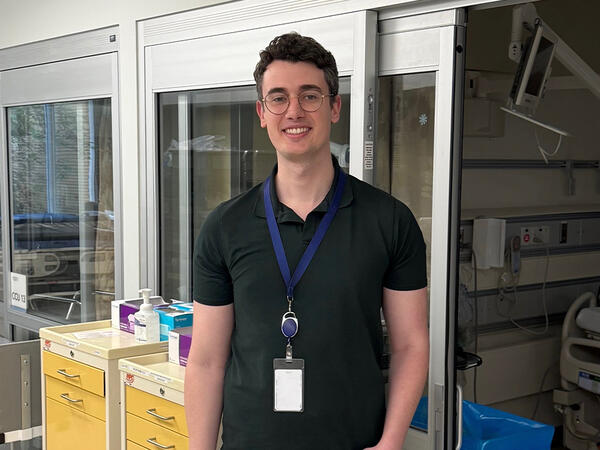Pharmaceutical Sciences PhD student Natalia Konstantelos discusses her research focused on the safety and effectiveness of osteoporosis medications, honing her grant writing skills, and future career paths.
What is your academic background and why is this area of research important?
I completed my Honour’s BSc in the Department of Pharmacology and Toxicology at the University of Toronto with a specialization in biomedical toxicology. This degree provided me with an in-depth understanding of pharmacokinetics and pharmacodynamics, and I completed a thesis project in a basic science setting that examined drug metabolism in mice. My project was incredibly interesting, but I quickly realized that I am more interested in determining drug effects in people and answering unmet clinical needs. A key pillar of toxicology is understanding that the true effects of drugs are unknown until they are used by many people. To determine real-world drug effects, large population-based studies are needed. Thus, I became interested in the field of pharmacoepidemiology that leverages large healthcare administrative data to estimate the real-world safety and effectiveness of drugs.
With an eagerness to learn, I decided to begin graduate studies in pharmacoepidemiology working with Dr. Suzanne Cadarette, a leading pharmacoepidemiologist. Pharmacoepidemiology falls within the Clinical, Social and Administrative Pharmaceutical Sciences Field at the Leslie Dan Faculty of Pharmacy.
I began my MSc training in 2019 supported by a Dean’s Entrance Award, and transferred into the PhD program in 2021, with research focused in the areas of pharmacoepidemiologic methods and osteoporosis drug effects.
My research interests include determining the safety and effectiveness of medications, as well as medication utilization using healthcare administrative data. My thesis is centered around osteoporosis, where I am investigating and testing fracture outcome identification methods among studies that use healthcare administrative data. I will then apply my findings to future empirical studies that consider medications effects on fracture risk.
What led you to your current Supervisor’s research group?
Upon researching Dr. Cadarette’s group, I found that many of her students had been successful with awards and grants, and I wanted to develop my skills in this area in addition to the pharmacoepidemiologic skills I’d gain through my thesis and coursework. Indeed, I have had the opportunity to work with Dr. Cadarette on many successful grant and award applications, including a Drug Safety and Effectiveness Cross-disciplinary training award, and two graduate-level Canadian Institutes of Health Research Awards (MSc and PhD!). Moreover, I also appreciated that Dr. Cadarette works directly with Osteoporosis Canada and physicians to identify and answer urgent clinical questions. Upon meeting Dr. Cadarette and the team during the interview process, I knew I found the right fit and that this research group created a friendly, positive learning environment.
What are some of the challenges you had to overcome within your research?
Coming from an undergraduate degree that emphasized basic research, I quickly had to learn epidemiologic methods and skills that I previously had limited experience with. However, due to the guidance of my supervisor, our analyst, and my fellow graduate students, I felt supported and excited to learn. Furthermore, I took an Introduction to Pharmacoepidemiology course and a course on Scoping Reviews offered at the Leslie Dan Faculty of Pharmacy as well as courses outside the faculty, which gave me a strong foundation from which I could independently learn additional methods and concepts. The scoping review course was important in the development of my thesis given initial delays in data access at the beginning of the COVID-19 pandemic. We then strategically decided to include the project developed in the scoping review course as part of my thesis, allowing me to work from home for timely completion of my projects. In turn, this scoping review uncovered a lack of transparency and little consistency in outcome identification methods and has led to additional projects.
How do you see your current research playing a role in your career?
I believe the research, writing, presentation and leadership skills gained during my PhD training will have an instrumental impact on my future career. At this point I am considering career opportunities in academia, government and industry – the key for me will be selecting a career where I can apply my pharmacoepidemiologic skills to help improve the health of populations. Beyond technical pharmacoepidemiologic skills, I also greatly value the soft skills that I have the opportunity to develop, such as leadership, presentation skills, and engaging with stakeholders to support clinically relevant questions that improve health and the healthcare system.
What do you like to do when you are not working on research?
When I’m not working on research, I enjoy cooking, watching movies, and travelling!
More News
Image

Pharmacy alum’s research shows how full-scope practice improves cancer care
Honoured with a national award, Adrian de Boer says his residency experience was a powerful reminder that he's making a meaningful change to the pharmacy profession.
Read More
Image

Pharmacy alum passionate about helping community pharmacists practice to full scope
As a pharmacy leader at Rexall, Heidi Wittke uses frontline experience to lead initiatives that improve patient care
Read More
Image

Bridging Research and Industry: GRIP 2025 highlights innovation and real-world impact
Over 200 attendees from academia, healthcare, and industry gathered last week for the 2025 GRIP symposium, celebrating the depth and diversity of graduate student research.
Read More
